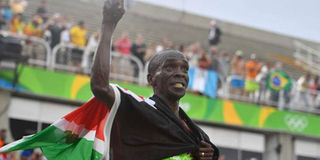The joy of winning the Olympics marathon

Kenya's Eliud Kipchoge celebrates after winning the 2016 Olympic Games Men's Marathon athletics event at the Sambodromo in Rio de Janeiro on August 21, 2016. PHOTO | OLIVIER MORIN |
What you need to know:
- Three Brazilian friends, draped in their national colours, asked for a selfie with me. It tickled me. I thought, ‘I am a celeb.’ But a few others quickly followed.
- I laughed as I obliged, thoroughly enjoying myself. There was fun all round
Perhaps because of my obsession with the marathon race, fate tested my will. On the night before Eliud Kipchoge, Wesley Korir and Stanley Biwott lined up for the original Olympic race, Brazil’s men’s football team faced Germany for the gold medal match. Brazil came to a standstill.
Memories of the 2014 World Cup semi-final 7-1 catastrophe against Germany are still fresh here. The desperation to avenge that loss was overwhelming.
The entire team of my scholarship sponsors, Agencia Publica, and their families, had to watch the game. So, to hang together, we all went to Copacabana beach at 2pm for the 5.30pm kick off and were just lucky to find space. The game was won by Neymar’s penalty, the last kick of the match, and the mother of all parties erupted. It went across the night.
And yet, the following morning was Olympic marathon morning and Kenya was a gold medal favourite. Can you fail yourself and your employer because of a party? That is an unforgivable crime. I was up at 4 am to write my daily chronicle from Rio. I finished it with sufficient time to head to Botafogo beach, the last turning point of the marathon.
I had passed fate’s endurance test.
A huge crowd was building up there but I arrived early enough to lean on the barriers. The Japanese, who are great marathon enthusiasts, dominated the noise and colour with banners of Tokyo 2020. Around me, I counted the nationalities of Peru, Bahamas, United States, Great Britain, Latvia, Kazakhstan and Brazil without including myself, from Kenya. It was an international gathering of friends even if it was a competition.
An air armada of six helicopters flying at different altitudes, a motorcade of about two dozen police motor cycles and about ten police and media cars heralded the arrival of the tightly bunched first group of runners. The cheers from the crowd reached fever pitch. I shouted: “Kenya! Kenya! Kenya!” Without knowing it, I was in an educated gathering.
As soon as that group turned the corner, people crowded around me. They asked whether I came from Kenya. With a flourish, I said yes and quickly added that the gold medal would be ours, not yours, sorry! They loved it. Three Brazilian friends, draped in their national colours, asked for a selfie with me. It tickled me. I thought, ‘I am a celeb.’ But a few others quickly followed. I laughed as I obliged, thoroughly enjoying myself. There was fun all round.
A man, who was either Korean or Japanese judging from the spectators around struggled with his English as he addressed me: “Kenya, very good! Famous! Marathon, good! Ethiopia, also good, but me like Kenya. You, also, run, run long race?”
Oh my God, I thought, a celeb’s life is so hard. First, selfies, now, interviews; the Brazilian police should throw a security cordon around me. I told him I enjoy running, which is true, but I didn’t tell him I stopped running long distances when I was mugged at the Railway bridge over Uhuru Highway one evening and barely escaped with my life.
I walked fast along Flamengo Park. Organisers purposely selected this route for the world’s cameras; it would exist only in romantic dreams were it not real. I came by the runners twice more as they made their back and forth runs, each time yelling “Kenya! Kenya! Kenya!”
Soldiers manning the route, all armed with automatic rifles, looked at me without so much as batting an eye lid. I shuddered to think what would happen if somebody tried to do something stupid.
At around kilometre 27, I took my position just after a gentle bend. And there they were, all three Kenyans running shoulder to shoulder. For a split second, there were four Kenyans, Korir, Biwott, Kipchoge and myself.
They were so close I could see the contours of the veins on their necks. They were bathing in their sweat. You felt you could hold their concentration with your hands. And with an energy that spares nothing, you urge them on. It is an exceptionally moving experience. At that point, my wish turned to conviction – the race was ours!
I turned away and started walking to the beach, following the live streaming on my phone. And then, with unsteady fingers and short of breath, I sent a frantic Whatsapp message to Natalia Viana, the Director of Agencia Publica: “We’ve done it!”
“Cool!” she replied.
On Tuesday, I walked along the deserted route of the marathon and sat by the sea. I felt the exhaustion of writing daily dispatches for the Nation and reports for Agencia Publica coming off the pores of my skin.
Without a deadline to chase for the first time since coming to Rio, I had slept the sleep of the dead. Yet my bones still ached.
But the marathon saved me. In the close-up faces of the Olympic champion and his team mates, I saw a purity of endeavour that needs no patronage to succeed and defies abysmal incompetence.
I saw a discipline that cultivates the stable will needed to override the pain of enduring 42 kilometres and I said to myself: You have filed your last chronicle and said farewell to your readers. File one more.
The champion has given you strength.




